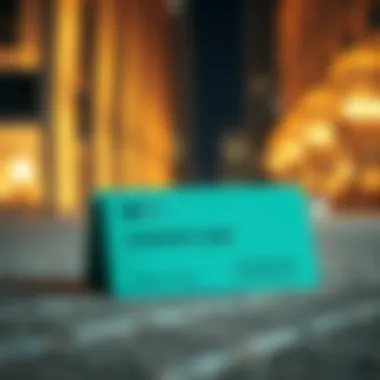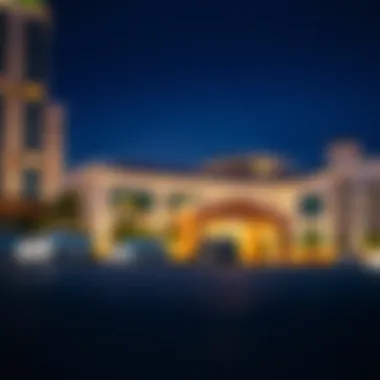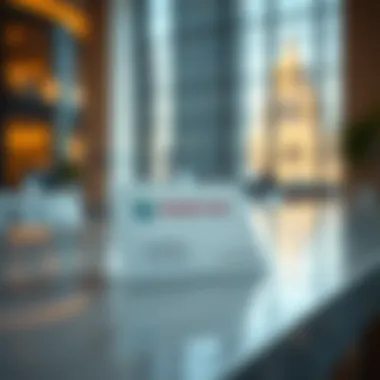Business Cards in the UAE: Insights for Professionals


Intro
In the unforgiving hustle of the professional world, particularly in a dynamic region like the UAE, a simple piece of paper can pack a punch. Business cards are not just quick means of contact; they serve as an extension of one’s professional image. In the United Arab Emirates, where cultures collide and diverse backgrounds intermingle, business cards take on a special significance. Understanding their role transcends mere practicality—it’s about cultural etiquette and making meaningful connections.
As professionals navigate this vibrant landscape, having an effective business card can make a lasting impression. But what makes a card truly effective? Various elements come into play, from design aesthetics to the information included. Moreover, networking in the UAE is nuanced—getting it right can open doors to collaboration and business opportunities.
This article will dissect the essentials of business cards in the UAE, exploring everything from cultural nuances to design tips, ensuring that every professional, whether a local or an expatriate, can navigate the networking scene with confidence and finesse. With a focus on how to leverage these cards effectively, let’s delve deeper into the market insights that shape this crucial aspect of professional life.
Understanding the Role of Business Cards in the UAE
In the bustling landscapes of the UAE, where the shimmering skyline meets a melting pot of cultures, business cards emerge as more than mere pieces of paper. They encapsulate identities, embodying professional aspirations and establishing essential connections in a fast-paced market. In such a dynamic environment, understanding the significance of business cards within the local context is crucial for anyone looking to navigate professional relationships effectively.
One key element that sets business cards apart in the UAE is their role in the cultural tapestry. The UAE's business practices are deeply rooted in customs and traditions that influence how networking is conducted. A well-designed business card can be a conversation starter, breaking the ice in a region where personal introductions hold great weight. It’s not just about exchanging contact information; it’s about presenting oneself and one’s brand in a way that resonates with diverse audiences, from expatriates to local entrepreneurs.
Cultural Significance
The cultural significance of business cards in the UAE cannot be overstated. They often serve as a first impression, acting as a reflection of one's professionalism and attention to detail. In a society where relationships matter, your card can offer a window into your values and your understanding of local customs. For instance, using gold accents or incorporating local motifs may resonate well with Emiratis, whereas a minimalist approach might appeal more to international professionals.
Moreover, the act of exchanging cards itself carries weight. It's not a fleeting moment but rather a ritual. When you hand over your card, it’s best to do so with both hands, indicating respect for the recipient. This gesture of courtesy can set the tone for future interactions, making it essential to understand the nuances of such a simple act.
Business Etiquette
In the realm of business etiquette, the use of cards comes with certain unwritten rules. Here are a few considerations to keep in mind:
- Timing Matters: Offer your card during meetings or introductions rather than in passing, highlighting the importance of the connection.
- Quality Over Quantity: It’s better to have a few high-quality cards than many mediocre ones. The material, finish, and design should communicate care and professionalism.
- Respect Personal Touch: Including a handwritten note on your card can be a nice touch, especially if you want to leave a lasting impression.
"A business card is often the first piece of your brand that potential clients see; make it count."
Key Components of an Effective Business Card
In the fast-paced world of business in the UAE, a business card is more than just a piece of printed paper. It’s a tool that carries significant weight and can open doors to countless opportunities. To stand out in the bustling marketplace, professionals must craft a card that is not only visually appealing but also effective in conveying essential information. This section will explore the key aspects that contribute to an effective business card, ensuring it serves its purpose in facilitating connections.
Essential Information to Include
When designing a business card, every piece of information included is of utmost importance. A well-structured business card should encompass the following details:
- Full name: Your name needs to be prominent and memorable. It's an obvious point, yet you’d be surprised how many cards neglect this.
- Professional title: Clarifying what role you play in your organization helps recipients understand your expertise.
- Company name and logo: Including the company’s name, along with its logo, enhances brand recognition. Make sure it pops without overwhelming the design.
- Contact information: Phone numbers, email addresses, and company website URLs should be displayed clearly. It's wise to include both local and international dialing codes, considering the diverse expat population.
- Social media profiles: Alongside traditional contact details, adding LinkedIn or other relevant professional profiles encourages networking in the digital age.
- Physical address: Though sometimes overlooked, especially if doing business online, it can still signal professionalism and trust.
Each component should be placed logically and designed to draw attention to the vital information. It’s important not to overcrowd the card; less can indeed be more. For example, you might want to keep the font size legible but not too large, with a balanced spacing that avoids clutter.
Choosing the Right Card Size and Format
In the UAE's competitive environment, the size and format of your business card matter just as much as the information it carries. While the standard business card size is 90 x 54mm, there are variations that can set you apart:
- Standard cards: The conventional size fits in wallets and business card holders neatly. It’s safe, but can be forgettable.
- Square cards: This trendy shape can in a way shake things up, making it more likely to be remembered.
- Thick or textured cards: Opting for a thicker paper or a textured finish can evoke quality, giving the impression of luxury and exclusivity.
- Folding cards: These allow for additional information and a creative layout but may not fit as seamlessly into wallets.
When considering the card format, think about how the card will be received and stored. Despite the temptation to push for creativity, it’s essential that the card remains functional. If it’s not user-friendly, you risk losing the interest of potential connections.
In summary, the business card acts as your first impression in many instances. By ensuring that vital information is presented clearly and choosing an appropriate size and format, you are setting the stage for successful networking in the UAE's vibrant landscape.
"Crafting a business card is like weaving a short story of who you are and what you offer, delivering it to the hands of those who matter."
For further insights on professional practices in the UAE, you might find this information useful: LinkedIn Business Networking Strategies or explore articles on business networking at Britannica.


Design Considerations for Business Cards in the UAE
Designing a business card in the UAE goes beyond aesthetics; it's about crafting an identity that resonates with cultural values and professional expectations. In a diverse marketplace like the UAE, where East meets West, the design elements of your business card can significantly impact first impressions and subsequent networking opportunities. Each component, from color to typography, carries its connotations and can either bridge gaps or create barriers in communication. Therefore, a thoughtful approach to design is essential for making a lasting impact in a competitive business environment.
Color Choices and Their Meaning
Colors speak a language of their own, especially in the rich tapestry of UAE culture. Choosing the right color for your business card can enhance its effectiveness. Here are some color choices and their implications:
- Green: Often associated with prosperity and growth, green is a color that reflects Islamic values. Many businesses use it to symbolize sustainability and environmental consciousness.
- Blue: A color denoting trust and professionalism. It is favored by many corporations, particularly in finance and real estate.
- Red: This vibrant color signifies passion and power. It draws attention but should be used sparingly, as it can also evoke feelings of aggression when overused.
- Gold: Represents luxury and prestige. Using gold elements can elevate your card’s appearance, but moderation is key to avoid seeming ostentatious.
Adding accent colors can also create a unique aesthetic. For instance, pairing a neutral shade with a bright accent can create visual interest while maintaining professionalism. However, it’s crucial to ensure that the color palette aligns with your company's branding and values.
"In the UAE, color is more than just decoration; it's a reflection of identity and values, artfully woven into the professional fabric."
Typography and Font Selection
Your choice of typography can greatly influence the readability and overall impression of your business card. Selecting fonts that are both modern and easy to read is paramount, particularly with the diverse audience in mind. Here are some considerations:
- Serif Fonts: These traditional fonts convey reliability. They’re often seen as formal and are suitable for industries like law or finance.
- Sans Serif Fonts: Offering a contemporary feel, sans serif fonts are clean and approachable. They work well for tech startups or creative businesses that want to convey a fresh image.
- Custom Fonts: In a market saturated with uniformity, a unique font can set your card apart. Just ensure it does not compromise legibility.
Font size is another critical factor. A size of at least 10-12 points is advisable for the main text to ensure it’s readable without straining the eyes. Mixing different fonts can add character, but limiting choices to two maximizes clarity and sophistication. Ultimately, every design decision—from color to typography—should reflect the essence of your brand while also resonating with potential clients and partners in the UAE.
Digital vs. Traditional Business Cards
In the fast-paced world of business, especially in the diverse environment of the UAE, professionals often find themselves grappling with a fundamental question: should they rely on digital business cards or stick to the traditional ones? Both have their merits, but understanding their distinctions can greatly affect how individuals make connections.
The Rise of Digital Business Cards
With the advent of technology, digital business cards have increasingly risen to prominence. They offer a sleek, modern approach to networking, serving as an eco-friendly alternative to their paper counterparts. In a city like Dubai, where innovation thrives, these virtual cards have found their sweet spot. A few key factors have propelled their popularity:
- Convenience: You can easily share a digital card with just a tap or a click, making them highly practical for on-the-go professionals.
- Multimedia Capabilities: Unlike traditional cards that provide only static information, digital cards can incorporate links to websites, social media profiles, and even videos. This aspect allows a more engaging introduction.
- Update Potential: If a company changes its address or phone number, updating a digital card is a breeze compared to reprinting a stack of traditional cards.
As important as these advantages may seem, there are also considerations to account for. Some recipients may not be as receptive to quick exchanges via smartphones, preferring the tactile experience of traditional business cards. The sentimental value attached to a physical card, especially in a culture that values face-to-face interactions, remains significant.
Benefits of Traditional Business Cards
Despite the allure of technology, traditional business cards continue to hold a vital place in professional networking. Several reasons elucidate their enduring relevance:
- Personal Touch: There is an innate value in physically exchanging cards. It often leads to better memory retention and a personal touch that strengthens initial impressions.
- Cultural Sensitivity: In the UAE’s business landscape, traditions still reign supreme. A well-designed card reflects thoughtfulness and respect for customs, especially in diverse settings where first impressions matter.
- No Power Needed: Traveling to networking events in environments where power sources are limited can prove tricky. With traditional business cards, you don’t have to rely on battery life.
"In a world of convenience, never underestimate the power of a simple handshake and a card exchange."
Networking Strategies in the UAE
Networking in the UAE is more than just exchanging business cards. It’s a crucial pillar for building lasting professional relationships in a melting pot of cultures and industries. In a nation known for its rapid economic growth and competitive markets, understanding the intricate dynamics of networking can spell the difference between mere existence and thriving amid a sea of opportunities. The UAE, being a hub for expatriates and entrepreneurs alike, provides the perfect landscape for utilizing strategic networking.
The key here is to cultivate connections that transcend mere transactions, establishing trust and rapport. In environments like Dubai and Abu Dhabi, where professional interactions are often influenced by personal relationships, your approach to networking could either open or close doors for future opportunities. What’s important is to engage thoughtfully and intentionally, as this can lead to fruitful alliances.
Effective Networking Practices
When it comes to effective networking practices in the UAE, there are a few strategies that stand out:
- Localized Communication: Get to know the cultural nuances and adapt your communication styles. Understanding Arabic greetings or local customs can smoothen interactions.
- Attend Industry Events: From exhibitions at the Dubai World Trade Centre to meetups in Abu Dhabi, these events are hotbeds for networking. Make it a point to attend relevant gatherings that align with your industry.
- Follow-Up Etiquette: After the initial introduction, following up is essential. A simple email or a message through LinkedIn can reinforce your interest in maintaining the relationship.
- Utilize Social Media: Platforms like LinkedIn serve as invaluable tools for building a professional presence. Actively participate in discussions relevant to your field and share insightful articles.
Many professionals find it helpful to note down significant details about new contacts’ interests or experiences. This practice can be beneficial when trying to reconnect, as you can reference past conversations.


Leveraging Business Cards for Connections
Business cards are not just pieces of printed paper. They are tools that represent you and your brand long after a meeting ends. In the UAE, where visual presentation carries weight, ensuring your business card reflects your professionalism is paramount.
Here are ways to leverage business cards effectively:
- Quality Matters: Use high-quality materials. A flimsy card can leave a negative impression, while a well-crafted one speaks volumes about your attention to detail.
- Tailored Design: Create a design that resonates with your personal or company brand. Make sure it’s adaptable to different networking scenarios; simple yet elegant usually works best.
- Appropriate Distribution: When you hand out your card, do so with intent. Rather than tossing them around indiscriminately, ensure the context of your interaction justifies sharing your card.
"The effectiveness of your business card increases when it serves as a conversation starter, not just a contact detail."
Legal Considerations for Business Cards in Dubai
Navigating the world of business cards in Dubai goes beyond just choosing a design or sharing contact information; it also involves understanding the legal framework that governs this practice. The significance of grasping these regulations cannot be understated, especially for professionals who aim to establish credibility and avoid potential pitfalls in the vibrant UAE market.
Regulations Surrounding Business Card Printing
When it comes to printing business cards in Dubai, specific regulations are in place that one must adhere to. The Dubai Economy's Department of Economic Development (DED) mandates that business cards should reflect accurate information that corresponds with the registration records of the business entity. Here are some key points to consider when dealing with business card printing in Dubai:
- Accurate Representation: Every detail on the card must accurately represent your business—this includes the company name, your position, and contact details. Misrepresentation can lead to legal complications.
- Approval of Designs: Certain industries might require approval for card designs, especially if logos or branding involve regulated elements. It’s wise to consult with local authorities if you're in this scenario.
- Language: While English is widely accepted, Arabic is often the preferred language for local businesses. Including both languages can enhance credibility in the eyes of local partners and clients.
- Business Card Templates: Many printing services offer templates that comply with local regulations, making it easier for you to design a card that meets standards without breaking any rules.
These elements ensure a professional appearance and help maintain transparency and trust among stakeholders.
Data Protection and Privacy Issues
With the increasing emphasis on data protection globally, Dubai is no exception. This is critical when discussing business cards, as they often convey personal information, raising concerns about privacy and data security. Here’s what you should know:
- Personal Data Management: Under the UAE's data protection laws, which align closely with international standards, it is your responsibility to ensure that any personal information on your business card is handled properly. This includes obtaining consent from individuals before sharing their information.
- Avoiding Unwanted Harassment: Sharing your card indiscriminately can lead to unwanted solicitation or harassment. It’s sensible to provide your business card only to individuals or entities you deem relevant to your professional goals.
- Confidentiality Clauses: If you work in sectors that deal with sensitive information—like real estate or finance—consider incorporating confidentiality clauses when handing out your card. This adds a layer of security regarding the information exchanged.
- Data Retention Policies: Familiarise yourself with data retention policies set by local regulations. Understanding how long you can keep someone’s contact information will be pivotal in preventing potential legal repercussions.
"In the intricate landscape of Dubai's business environment, understanding legal obligations concerning business cards is paramount for establishing a trustworthy professional entity."
Thus, professionals operating in the UAE must stay informed about these legal considerations. A well-composed business card not only reflects professionalism but also embodies the respect for regulatory compliance, effectively bolstering one's reputation in this competitive market.
Innovative Business Card Ideas
In the competitive landscape of the UAE, where first impressions can make or break a deal, the way professionals present themselves is crucial. Innovative business card ideas can help individuals stand out amidst a sea of conventional designs. Use of unique materials and interactive features can turn a simple card into a memorable experience. These approaches not only serve the traditional purpose of information sharing but also communicate creativity, personality, and professionalism.
Unique Materials and Shapes
When we talk about unique materials and shapes for business cards, it’s not just about being different for the sake of differentiation; it’s about making a statement. Cards made from such materials as wood, metal, or even recycled plastic can evoke a sense of sustainability and style. Consider, for example, a card crafted from bamboo. Not only does this showcase an eco-friendly initiative, but it also provides a tactile experience impossible to forget.
Choosing shapes beyond the typical rectangle is another game-changer. Cards shaped like a local landmark, such as the Burj Khalifa or the Palm Jumeirah, could resonate well with clients in Dubai. The good thing is that people usually keep items of interest, meaning these attention-grabbing cards hang around longer than their standard counterparts.
Moreover, the texture of the materials used can play a role in the impressions left on potential clients. A silk-finished card can feel luxurious, while an embossed design can illustrate creativity and depth. Thus, when selecting a material and shape, think of the narrative it tells about not just you but your brand as well.
Interactive Business Cards
The idea of interactive business cards is not just a trend; it’s becoming an expected norm in an age dominated by technology. A static card may provide contact details, but an interactive one can tell a story and create connections. For instance, consider incorporating QR codes that lead to a professional website or a video introduction. This offers people a way to engage without needing to input information manually.
Additionally, augmented reality (AR) can add a layer of interactivity that captivates users. Imagine handing over a card that comes to life on their device, offering a virtual tour of your projects or a glimpse of your services. Such an experience creates a memorable interaction that makes it likely for them to recall your presentation in the future.
Other possibilities include cards with embedded NFC chips that allow recipients to tap their phones and instantly save your contact information. It simplifies the networking process and aligns well with the fast-paced environment professionals navigate today in the UAE.
"Innovative design in business cards is not only about standing out; it's about crafting a memorable experience."
Sustainable Practices in Business Card Production


Creating business cards is not merely about design; it intertwines with broader themes of sustainability in today’s world. The significance of sustainable practices in business card production resonates especially well in the UAE, where rapid growth meets increasing environmental consciousness. As businesses strive to remain competitive, they must also acknowledge their environmental footprint, making eco-friendly practices a genuine necessity rather than an option.
Eco-Friendly Materials
When it comes to business cards, choosing eco-friendly materials is a pivotal step towards sustainability. Options like recycled paper, bamboo, and plant-based plastics are gaining traction, offering not just a green alternative but also unique aesthetic qualities every professional can leverage. Using recycled paper can reduce the demand for new raw materials, conserving forests and minimizing waste.
Materials such as linen or uncoated paper often have a lower environmental impact compared to traditional cardstock. In the bustling UAE market, where innovation is key, businesses can stand out by opting for unconventional materials that resonate stronger with the environmentally-conscious clientele. Furthermore, investing in sustainable materials can enhance brand image, appealing to consumers who value corporate social responsibility.
Examples of Eco-Friendly Materials:
- Recycled paper: Derived from post-consumer waste, helps reduce landfill contributions.
- Bamboo: Renewable resource with rapid growth, boasting a modern aesthetic.
- Seed paper: Business cards that can be planted after use, sprouting flowers or herbs.
Benefits of Sustainable Design
Embracing sustainable design when producing business cards yields numerous benefits that go beyond mere aesthetics. Firstly, it often leads to cost savings in the long run. For instance, while some eco-friendly materials might have a higher upfront cost, they can often reduce waste and lower printing costs. Moreover, sustainable business cards help build a positive brand image, allowing businesses to connect with like-minded stakeholders and clients drawn to environmental initiatives.
Another advantage is the potential for storytelling. Business cards crafted from sustainable materials can convey a narrative about the brand's commitment to the environment, an aspect that resonates with today’s consumers. This narrative fosters a deeper connection and can drive customer loyalty based on shared values.
Maintaining Your Business Network
In the fast-evolving business environment of the UAE, maintaining your professional network is not just a trivial pursuit; it can be the backbone of your career success. The UAE is home to a mosaic of cultures, industries, and professionals, making networking essential for navigating this diverse landscape. By effectively managing your connections, you not only enhance your visibility within your field but also open doors to new collaborative opportunities and insights that could spur innovation and growth in your work.
A strong professional network can provide a wealth of information about the local market trends, regulations, and cultural nuances that are crucial for expats and local businessmen alike. Moreover, when you foster good relationships with others in your industry, you are creating a safety net of mutual support. From sharing best practices to referrals for new clients, the benefits of a well-maintained network are numerous and tangible.
Building a network is like planting a garden; it requires regular attention and care to flourish.
Follow-Up After Initial Meetings
Following up after initial meetings is a critical aspect of keeping your professional ties alive. After exchanging business cards, it should not be a "one-and-done" scenario. Instead, consider these strategies to make your follow-up impactful:
- Personalized Emails: Shoot a quick email thanking the person for the meeting. Mention a specific topic from your conversation to jog their memory. This shows that you value the interaction and are interested in their work.
- Connect on Social Media: Platforms like LinkedIn are tailored for professionals looking to stay in touch. A simple connection request after a meeting ensures that you remain on their radar and can easily share industry news or insights.
- Schedule a Subsequent Meeting: If appropriate, propose a follow-up meeting to discuss ideas further or get to know each other better. This commitment to ongoing communication can solidify your relationship.
Remember, the goal is to establish a rapport that invites continued exchanges rather than treating the initial meeting as a singular event. This commitment to follow-up reflects positively on your professionalism.
Utilizing Business Cards for Future Opportunities
Business cards serve more than just the purpose of sharing contact information; they are a tactile reminder of who you are and what you represent. Here's how you can leverage business cards to create future opportunities in your network:
- Distribution: Hand out your card whenever the opportunity arises. This includes formal and informal meetings, conferences, and even chance encounters; you never know who might benefit from your services.
- Strategic Placement: Keep your business card handy in your wallet or a dedicated section in your handbag. Placing them where they are easily accessible helps when opportunity knocks unexpectedly.
- Follow-Up with a Card: When you send a follow-up email, consider including a digital version of your business card. This serves as a low-key reminder of your meeting and ensures they have your info easily available.
Moreover, think about adding a brief note on the back of your card that reflects a memorable aspect of the conversation you had. This small personal touch can make your card stand out from the others they’ve received.
As you put these practices into play, your business card becomes more than just a flat piece of paper; it transforms into a tool that facilitates ongoing dialogue and future partnerships.
Closure and Future Outlook
The evolution of business cards in the UAE speaks volumes about how professional interactions have adapted in a fast-paced and diverse environment. Traditionally viewed merely as a piece of cardstock carrying essential contact details, business cards in the UAE have transformed into vital tools for establishing one’s identity and brand in the local market. This transformation does not only reflect the changing dynamics of networking but also signifies a cultural shift toward deeper, more personalized connections in business relationships.
The Evolving Role of Business Cards
The role of business cards is no longer confined to simple introductions; they have morphed into mini advertisements for personal brands. In a market like the UAE, where competition is fierce and opportunities for networking abound, having a well-crafted business card can significantly elevate one’s visibility. Card designs that echo the cultural aspects and aesthetics appreciated in the region tend to resonate more with the diverse audience.
In recent years, we’ve also observed a trend where technology interfaces with traditional formats. Digital business cards are gaining traction, merging convenience with sustainability. However, it’s the tangible nature of traditional cards that often leaves a lasting impact in face-to-face interactions. The tactile experience cannot be replicated, making old-school cards still very relevant. To combine both worlds, many have resorted to creating cards that integrate QR codes linking to digital portfolios or company websites, enabling seamless transitions from the physical to digital realms.
Final Thoughts for Professionals
For professionals operating within the UAE's bustling marketplace, understanding the impact of a business card can set one apart from the crowd. It’s essential to view the card not merely as a utility but as a strategic asset. Such an approach allows for thoughtful engagement with potential clients and partners.
In synthesizing the lessons drawn from this analysis, one must consider the following:
- The design and content of a business card should align with both personal branding and cultural expectations in the UAE.
- Businesses are encouraged to remain innovative—combining traditional aesthetics with modern technology can greatly enhance the networking experience.
- Sustainability should be kept in mind—eco-friendly practices not only appeal to environmentally-conscientious stakeholders but also reinforce a modern brand image.







